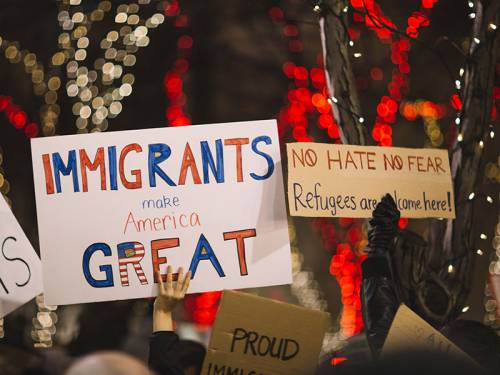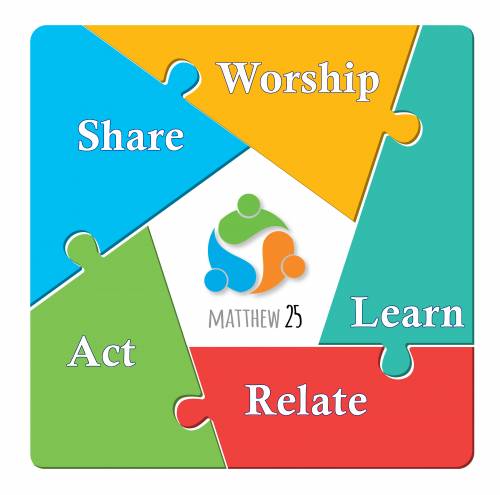WHAT IS STRUCTURAL RACISM?

PC(USA) marches for an end to cash bail systems that disproportionately affect people of color and people who live in poverty.
Race is a socially constructed concept that purports to use characteristics such as skin color, facial features, and body structure as a basis for classifying people. It has no scientific or biological basis. It was introduced during the period of European colonial expansion.
Prejudice is pre-judgment in the absence of evidence and held even when evidence contradicts it.
Social power is the capacity of individuals and groups to determine what happens in society. Their decisions and actions then shape society’s values, beliefs, institutions, and systems.
Racism = Racial hierarchy + Prejudice + Social power
Racism is the combination of social power and racial prejudice to create systems that treat people differently, based on their defined racial group. Privileges are provided for some while dehumanizing, excluding or oppressing others.
What is structural racism? Structural racism is the normalizing of racism within institutions and structures. Once racism is structural and institutional (as it is in the United States), it creates ongoing, persistent inequality. Inequality occurs in accessing money, land, housing, education, health, information, and social power. Because inequality is a part of the structures and institutions that we interact with every day, it often goes unquestioned and unchallenged by most of society or the dominant culture. In the United States, structural racism particularly advantages white people while producing negative impacts for people of color.
Important notes:
- Racism is measured not by intent, but by its impact on those who are oppressed.
- Racism can be overt or covert, individual or systemic, intentional or unintentional.
- Racism grants privilege to some and sustains the dominant group.
- Racism exists everywhere in our society, and in all institutions, including our church.
(notes adapted from https://united-church.ca/social-action/justice-initiatives/anti-racism)
WHAT DOES OUR FAITH DEMAND?

Reader one: Racism is a lie about our fellow human beings, for it says that some are less than others. It is also a lie about God, for it falsely claims that God favors parts of creation over the entirety of creation. Because of our biblical understanding of who God is and what God intends for humanity, the PC(USA) must stand against, speak against and work against racism. Anti-racist effort is not optional for Christians. It is an essential aspect of Christian discipleship, without which we fail to proclaim the Good News of Jesus Christ.
Reader two: Though we create hierarchies that do not recognize nor celebrate the beauty of the diversity of God’s creation; Though we embrace human boundaries that divide and separate us distorting God’s intention for humanity, God gives us the gift of unity. Let us work to realize the fullness of this gift.
Reader three: We will not passively accept unjust systems for the sake of a false peace; We will take on the hard work of dismantling, stone by stone, the systems of oppression that divide and subjugate our siblings. We will build, living stone by living stone, societies marked by justice and love. God calls us to reconciliation. Let us repair that which we’ve broken.
(Adapted from 30 Days with the Confession of Belhar devotion and prayer by Rev. Robina Marie Winbush, and from the 2016 General Assembly policy “Facing Racism”.)
HOW DO WE DISMANTLE STRUCTURAL RACISM?

We work in our worship, learning, relationships, actions and sharing to dismantle structural racism. Some suggested resources are below.
Worship:
Incorporate components of the Confession of Belhar in your worship.
Host a Matthew 25 worship resource for Dismantling Structural Racism.
Learn:
Engage youth with the “When did we See You” resources from Presbyterian Triennium and Youth.
Use Bending the Moral Arc resources to dismantle structural racism through courageous conversations to promote a deeper understanding and awareness of the profound impact of racism in all our lives.
Educate youth with this quicksheet Exploring Justice on the Road: An Intergenerational Civil Rights Bus Tour.
On a personal level, read and examine your own experiences of race and privilege: Peggy Macintosh, “Unpacking the Invisible Knapsack”.
On a congregational level, we can study together what our faith says and how we are called to make a difference. A resource to use in church settings is: Facing Racism study guide.
For predominantly white congregations, use this assessment tool to ask questions and discern action steps, developed by Rev. Katie Crowe, Trinity Ave. Presbyterian Church, Durham, NC. Download here.
With children, use this Children’s Anti-Racism toolkit.
Explore racial justice issues through these film and video clips: Flint: The Poisoning of an American City. Documentary follows environmental racism that contributed to lead poising of children and families in Flint, Mich. Sacred Conversations on Race. Women of Faith who Challenge Systemic Racism and Oppression: Liz Theoharis. Knox Presbyterian Church – Dismantling Structural Racism.
Host book studies on: No Innocent Bystanders: Becoming an Ally in the Struggle for Justice by Shannon Craigo-Snell and Christopher Doucot; Anxious to Talk About It: Helping White Christians Talk Faithfully about Racism by Carolyn B. Helsel; What Kind of Christianity: A History of Slavery and Anti-Black Racism in the Presbyterian Church by William Yoo.
Relate:
In order to prepare ourselves to form genuine and mutual relationships, we first examine our own cultural assumptions, privilege, and life encounters with racism through an anti-racism training such as one led by the PC(USA) Office of Gender and Racial Justice or Crossroads Anti-Racism Training.
Act:
Find ways in your community to support and welcome immigrants and refugees.
Invite your session and congregation to affirm Black Lives Matter and devise steps or initiatives that put the affirmation into action, always ensuring that there is accountability to Black groups with whom the congregation has developed relationships.
Join in rallies and marches for changes in public policy in your local area, standing against Asian-American, Pacific Islander hate, advocating for indigenous and Native American rights, and standing with Black and other activists or color.
Share:
Form or join your local SDOP committee.
Give to funds for Native American churches.
Support the new Restorative Actions fund launched by the co-moderators in 2022.
WHO DO WE CONTACT AT THE PRESBYTERIAN MISSION AGENCY, TO LEARN MORE, TO INVITE SPEAKERS, AND TO BRAINSTORM FURTHER?
To learn more, contact Samantha Paige Davis (she/they), Associate for Gender, Racial and Intercultural Justice at samantha.davis@pcusa.org, visit the Facebook page here, or connect with your region’s Mission Engagement Advisor who can connect you to Samantha Davis and other PC(USA) staff and denominational resources.
